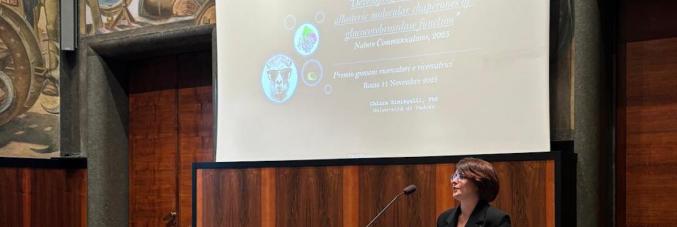
The research on nanobodies by Unipd won in the "Personalised Medicine" category at the Premio del Gruppo 2003
12.11.2025
Chiara Sinisgalli, a researcher at the Department of Biology of the University of Padua, was awarded in the fourth edition of the Young Researchers Award by Gruppo 2003. The award ceremony took place on Tuesday, 11 November, at the headquarters of the National Research Council (CNR) in Rome, in the presence of the CNR president, Andrea Lenzi, and the president of Gruppo 2003, Rocco De Nicola.
Chiara Sinisgalli received the award in the "Personalised Medicine" category for her research on nanobodies, which act as molecular chaperones correcting protein defects in Parkinson's disease, thus opening new personalised therapeutic possibilities. The study, entitled "Developing nanobodies as allosteric molecular chaperones of glucocerebrosidase function" and published in «Nature Communications» in May, was coordinated by Nicoletta Plotegher, a professor at the Department of Biology of the University of Padua.
The professor's laboratory also received Telethon funding to investigate how these nanobodies could represent a new therapeutic strategy for Gaucher disease with a personalised medicine approach for patients with different forms of this condition.
Luigi Bubacco, director of the Department of Biology, commented: "Innovation always stems from ideas. The great value of our young researchers, such as Chiara, lies in their innovative contribution to research, which must be valued and supported in an environment that we strive to make increasingly solid and stimulating."
The Young Researchers Award by Gruppo 2003, now in its fourth edition, is promoted by the Gruppo 2003 Association for Scientific Research. This year, the award recognised ten winners, one for each of the categories of interest to the group: agriculture, astronautics, astrophysics and astronomy, biodiversity, climate change, cybersecurity, artificial intelligence, personalised medicine, natural and anthropogenic risks, multiple sclerosis. Targeted at researchers with less than seven years of post-doctoral experience, the call received 470 applications. In addition to the ten first prizes, Gruppo 2003 awarded sixteen special mentions to works distinguished for originality and scientific relevance.



